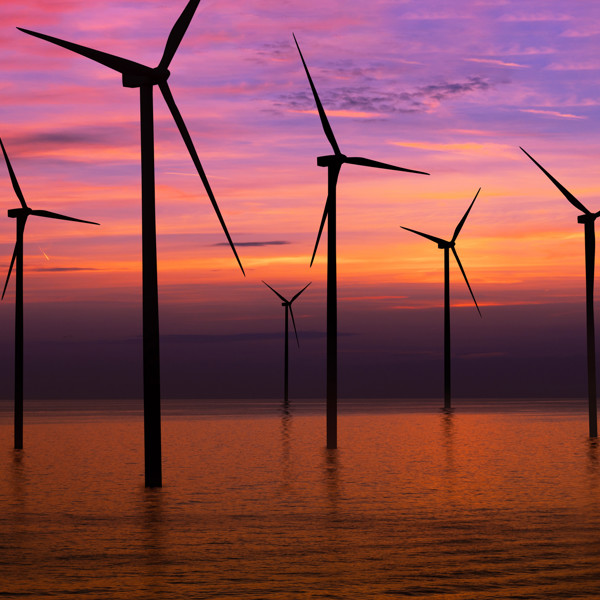On Wednesday 5 June, we welcomed representatives from contractors, developers, insurance companies, legal firms, and other stakeholder groups to the De Vere Grand Connaught Rooms in London to explore solutions to challenges in offshore wind contracting, following the revision of IMCA's Standard Transport and Installation Contract for Offshore Wind.
The seminar - Building Resilience and Certainty in an Uncertain World - started with IMCA CEO Iain Grainger describing how the offshore wind industry was operating in "an unsustainable way" prior to IMCA launching its first Standard T&I Contract in 2023, due to contractors being forced to take on an unfair amount of risk - leading to high-profile projects being delayed or cancelled.
He noted that the contract has now been translated into a number of international languages for use around the world, in line with the global growth in offshore renewable energy infrastructure.
However, the industry is faced with a number of unforeseen challenges, he said, such as high levels of global geopolitical risk, and country specific barriers to growth including the requirement for marine contractors to obtain visas to work in UK waters. These have meant that vessels have not been able to start some planned offshore installations projects, impacting the growth of offshore wind and global progress towards decarbonisation.
The second presentation was from Albert Tarter of Green Giraffe, financial advisers to the renewable energy sector, who gave a lender's perspective on the prospects for growth in the offshore renewable industry, given the challenge of lending to a sector that operates on thin profit margins. Renewable energy needs to be competitive with fossil fuels and work needs to be done with effort, innovation, and collaboration in order to achieve profit. For risk and return to be balanced, underlying risks need to be reduced to improve lending options, he said.
The third discussion, led by Dr Tony Rooke, was on the subject of insurance and the importance of challenging markets to find solutions. Dr Rooke echoed previous concerns on how to tackle the challenge of lowering emissions while ensuring projects are commercially viable. How does wind compete with solar and gas for example? The industry is also challenged by the problem of the growth in the size of offshore wind turbines and the lack of sizable vessels to transport and install them, he said. Most importantly, if insurers are to cover the industry they need to understand what future risks are. Despite all this, his closing message was one of hope, though he warned that greater innovation would be needed from the insurance sector, along with help from governments and the wider industry, in order to achieve the quantum of development required to reach net-zero.
Sylvia de Rooij of Heerema, and Vice-Chair of IMCA's Legal, Contracts, Insurance, and Compliance (LCIC) Committee, followed with her analysis of IMCA's new T&I Contract and the FAIR acronym that underwrites it, focussing on external contractor risk: “what is bankable is not always contractable,” she said.
During the morning’s Q&A the industry questioned whether climate targets were realistic, and that the global relocation of resources to defence was limiting the people and resources available to the energy transition, meaning that governments would need to put money behind the industry in order to achieve their net-zero targets.
Iain Grainger, IMCA CEO

The industry is faced with a number of unforeseen challenges like the UK VISA problem, and the high level of global geopolitical risk which has meant that vessels haven’t been able to complete offshore installations projects, and which will of course, impact Net Zero if more collaboration isn’t achieved.
It was also highlighted that the development of traditional energy sources has had a lot longer to mature compared to offshore wind, making it hard for the renewable sector to compete on purely financial terms. The panel raised their own question by asking whether as a society we’d be willing to spend more to fully transition to renewables when considering the true cost of climate change and global temperature rises.
Katy Heidenreich, of Offshore Energies UK (OEUK), pointed out that the UK was in a good place for contractors to deliver clean energy by 2030, but that a pragmatic approach was urgently needed. Focussing on the polarising debate of 'oil and gas vs renewables' should be avoided in order to move forward, and better collaboration along with industry mutual support was necessary, she said.
She went on to highlight the significance of the IMCA Standard Contract and in her call for greater industry collaboration reminded the audience that non OEUK members could participate in its work. She echoed the phrase “by industry for industry” and called for extensive peer review and collaboration as well as an even closer working relationship with IMCA.
The afternoon’s Q&A panel focussed on ambitions to scale up green energy. The 'energy trilemma' of affordability, energy security, and environmental sustainability will mean finding a balance between these three elements, and the need for contractors to take an appropriate amount of risk in the contracting process.
The audience heard that offshore wind was a complex sector, especially considering the difficulties of taking an onshore product and installing it in much harsher weather conditions. However, the premise of liability based on fault does not benefit the industry because it raises everyone’s costs. This leaves the challenge of creating an insurance product that works and addresses the industry’s particular challenges.
The panel suggested that a lack of understanding by underwriters was one of the complicating issues for the industry, as they are not set up to review and understand contracts even in basic terms and in turn don’t understand the commercial pressures on contractors. 'WELCAR' - a widely used standard wording for offshore construction 'all risks' insurance policies - could in fact be part of the solution if the risk is spread, as this is an insurance product that provides economies of scale and offers more transparency than some industry contracts.
Kees de Looff of Van Oord closed the seminar by repeating the importance of IMCA's Standard T&I Contract. He wrapped up with a big picture view of the energy sector, pointing out that ultimately oil and gas are a finite resource and that if we don’t find solutions for renewables we could in future be held hostage by nations with greater reserves.
Maggie Hickland from Allseas, Chair of IMCA’s LCIC Committee, again reiterated the need for much greater collaboration between contractors, insurers, developers, and lenders, urging all parties to come to a shared understanding of these projects. There needs to be a simplification of contracts going forward if we’re to make progress, she said.


